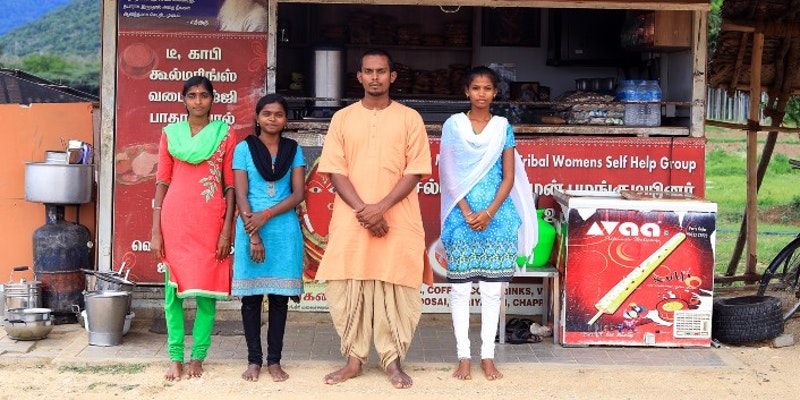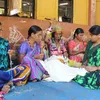From an investment of Rs 2,400 to annual turnover of Rs 24 lakh: how 12 women in a remote tribal village took control of their life
A group of tribal women from Thanikandi, one of the most interior villages in Coimbatore district, started a small eatery near Adiyogi. A year later, they have made a profit of Rs 9.5 lakh and are working to generate employment for other women.
When 12 women from Thanikandi, a tribal village in Coimbatore district, decided to establish a small-scale eatery, little did they imagine that they would be the owners of a thriving business a year down the line. The enterprise has improved their living standards, but - more importantly - has given them an opportunity to explore their potential in new and challenging ways.
1564366800452.jpg?fm=png&auto=format)
Set up by 12 women, the little eatery caters to tourists at Adiyogi, offering tea, coffee, snacks, and savouries.
Usha is part of the eatery enterprise group and drives an eight-seater buggy that ferries tourists from the famed Adiyogi statue at the foothills of Velliangiri to the Isha Yoga Centre about half a kilometre away. The little eatery caters to tourists at Adiyogi, offering tea, coffee, savouries and snacks, including mini meals like idli and masala rice. The items are all economically priced and are a big hit with tourists who disembark from buses after long journeys. The buggy ride is an offshoot of the eatery business.
“I’ve always loved driving, sports, adventure,” says the young woman whose tribal community cannot offer her any of these opportunities. “I’m happy to get this opportunity to drive,” she says smiling. Prior to getting the eight-seater, the women used a three-wheeler to ferry tourists.
It all started when Swami Chidakasha visited Thanikandi as part of Isha Foundation’s tribal welfare programme and floated the idea of a women-run tea stall at Adiyogi. The objective was to enable the women to establish and sustain an income-generating activity that would afford them better living standards and nutrition choices. While the idea sounded simple and straightforward, it was anything but.
Quite literally uphill
Thanikandi is a deeply forested tribal village with less than 200 inhabitants. Of the 53 houses in the village, only 30 are inhabited. Unlike most of rural Tamil Nadu, this tribal village doesn’t engage in agriculture. Residents don’t own farm lands and the only source of income is sporadic farm labour or other daily wage labour. Most of the residents are not literate –Thanikandi still awaits its first graduate. Some first generation learners have completed Class 8 and dropped out of school.
The tribal community depends largely on government schemes and welfare activities by non-governmental groups for basic necessities.
“Both the men and women are not skilled,” says Swami Chidakasha. “If they have to be employed, they have to be trained – in practically everything.”
He adds: “Swami Nandikesha, Swami Vasunanda and a few other Swamis had done a lot of work with this community so they were familiar with us. It made it easier for me to enter the village and speak about the entrepreneurship idea which was proposed by Swami Nandikesha. But we didn’t approach the community directly. We went through some of the women from Thanikandi who were already working in our kitchen.”
There were virtually no takers in Thanikandi when the idea was initially floated. “We were very hesitant to go out and try our hand at business,” says Shivagami, who eventually did sign up. “Our families were also not keen on sending us to dabble in business. But Swami kept coming to the village and talking about the idea. He never gave up even though practically no one was showing interest. Because of Swami’s persistence, we thought we should at least give it a try,” she says chuckling at the memory.
Finally, a group of 12 women came together and decided to start. They invested Rs 200 each and began a tea stall that opened for business on April 8, 2018. They borrowed stoves, utensils, and other kitchen items from neighbours, the Isha kitchen, the Isha canteen, and brought some from their own homes.
From making tea to keeping accounts and customer service, Swami Chidakasha trained them extensively. “It was very tough initially,” says Swami, about bringing the women together and making them function as a team.
1564366972209.jpg?fm=png&auto=format)
Under the tutelage of Swami Chidaksha, the 12 women borrowed utensils and other essentials to open shop. They have now returned all that they borrowed and are 'paying it forward' by generating employment for other women.
“They had no orientation towards an activity like this. They would frequently get into quarrels among themselves, they wouldn’t come on time, they wouldn’t serve customers promptly, they had no clue of how items were priced and would undersell them. One of them walked off because of internal disagreements. Just getting them to come on time, agree on things, and open the shop was a huge effort.”
The turnaround
Defying their wildest expectations, the little enterprise generated a turnover of Rs 90,000 in the very first month. All the women got a share of the profits. Four months later, they made a profit of Rs 1,65,000 and each of them got around Rs 15,000 in hand. It was more money than they had ever seen.
“It was not the money alone,” Swami Chidakasha says. “Yes, that was a big incentive but for the women, it was a revelation that they had actually learnt to create wealth. It was very touching when they shared how they used that first share they received.”
“One of the women told me, ‘Every year during Deepavali, my husband buys clothes for me. He has never bought anything for himself all these years because we were always short of cash. For the first time, this year I bought clothes for him from my earnings. I can’t explain how it feels.’ Most of these women can’t read or write. They have never worked at anything other than daily labor, so for them contributing to the family income is a huge transformation,” says Swami.
It was also transformational on another level – it made people in the village more aspirational. “In the beginning, my family was not too happy that I was going to invest and start a business with other women. But when they saw our earnings and our personal growth, they began to look at us in a new light,” says Shivagami, one of the women who works full time at the shop. The women’s story caught the attention of local media and they became mini-celebrities in their village.
Shivagami says many women in the village now wish for a similar opportunity. “They ask if they too can start something like this and grow it into a lucrative business. I was the first one in my village to buy a fridge with my own money,” she says, a touch of unmistakable pride in her voice. “
People wonder why I need a fridge in my house as there’s hardly anything in it but it’s for my husband. When he was a boy, someone asked him ‘What do you have in your house?’ He was forced to say ‘Nothing’ because they were so poor. He decided that day that if his child is ever asked that question, his child should be able to say ‘I have a TV, I have a fridge, I have all the things a house should have.’ I’m very happy that I was able to fulfil this wish of his,” she says, smiling.
Scaling greater heights
Six months after they opened shop by borrowing what they needed, the group returned everything they had borrowed. They were able to purchase new items from the earnings. They also replaced the three-wheeler with an eight-seater buggy, paying for it from their profits.
“We had a turnover of Rs 8 lakh in six months. We used the money - after dividing the share for the women - to buy a new battery-operated vehicle from which the women are now earning around Rs 5,000 a day,” Swami Chidakasha says. The ride costs Rs 10 per head.
On their first anniversary this April, the books showed an annual turnover of Rs 24 lakh with a profit of Rs 9.5 lakh. What started as a little tea stall has transformed into an eatery that now stocks new items on the menu. It has even outsourced some of the items and generated employment for other women.
_(1)1564366870375.jpg?fm=png&auto=format)
The tribal women who founded the tea shop used a part of their profits to buy an eight-seater buggy that's used to ferry tourists from the famed Adiyogi statue to the Ishan Yoga Centre.
“We want to buy another vehicle in a year’s time,” says Gayatrim who works at the shop. “We definitely want to grow the business,” agrees Usha. These women were barely able to manage their household expenses. Today, they make business plans.
“Swami Chidakasha taught us everything,” says Shivagami with gratitude. “He taught us how to make tea, how to cook, how to serve customers, pricing products, discipline, everything. He gave us confidence that we can do this. When we didn’t believe in ourselves, Swami believed in us and made us do this and demonstrate to our community what we can achieve. Actually, he did most of the work in the first six months and we took all the profits; we didn’t know anything at that time, so he had to intervene for every little thing,” she laughs.
“There is a tremendous change in these women from one year ago,” Swami says. “They still have some way to go but they have come a long way. They value what they have created. Earlier, they were simply getting handouts. It was not good for them, for their growth and wellbeing. Now, they have pride, commitment, skills, and the confidence to stand on their feet,” Swami says.
(Edited by Teja Lele Desai)














